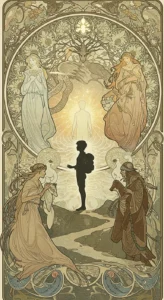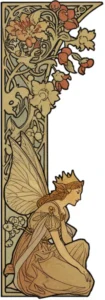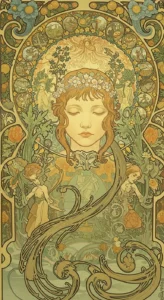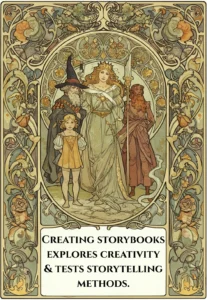
 upon a time, in a land filled with whispering woods and sparkling streams, where brave knights battled dragons and kind princesses befriended talking animals, stories unfolded that held more magic and mystery than met the eye. These weren’t just stories to lull children to slumber, but essential tools in a child’s journey toward adulthood and finding their place in society.
upon a time, in a land filled with whispering woods and sparkling streams, where brave knights battled dragons and kind princesses befriended talking animals, stories unfolded that held more magic and mystery than met the eye. These weren’t just stories to lull children to slumber, but essential tools in a child’s journey toward adulthood and finding their place in society.
The Enchanting Power of Fairy Tales
 Fairy tales are so much more than simple narratives; they are vital instruments that help children experience the world in a safe and understandable way. They entertain and spark their imagination with magical realms, talking animals, or supernatural beings, offering “new dimensions to the child’s imagination“. This imaginative engagement is crucial for the clarification of unconscious processes. Fairy tales “carry important messages to the conscious, the preconscious, and the unconscious mind“. Through “symbolic representation“, these stories often present symbolic journeys of inner change. While the sources do not explicitly detail “dream research” in a testing context, they highlight that fairy tales resonate with universal themes that tap into a child’s inner world. By witnessing challenges and eventual triumphs, a child’s confidence is validated, fostering a belief in their own ability to overcome difficulties.
Fairy tales are so much more than simple narratives; they are vital instruments that help children experience the world in a safe and understandable way. They entertain and spark their imagination with magical realms, talking animals, or supernatural beings, offering “new dimensions to the child’s imagination“. This imaginative engagement is crucial for the clarification of unconscious processes. Fairy tales “carry important messages to the conscious, the preconscious, and the unconscious mind“. Through “symbolic representation“, these stories often present symbolic journeys of inner change. While the sources do not explicitly detail “dream research” in a testing context, they highlight that fairy tales resonate with universal themes that tap into a child’s inner world. By witnessing challenges and eventual triumphs, a child’s confidence is validated, fostering a belief in their own ability to overcome difficulties.
Hero figures in fairy tales provide children with relatable characters facing challenges to overcome, fostering courage and hope. These stories suggest that “a rewarding, good life is within one’s reach despite adversity—but only if one does not shy away from the hazardous struggles“.
The Art of Storytelling
 While both storytelling and reading are valuable, telling a story fosters a more personal and immediate connection, evoking shared feelings. Storytelling allows for flexibility in explaining context or softening scary topics. As noted in the Oulton College “Literacy Syllabus,” students in the Early Childhood Education (ECE) and Educational Assistant (EA) programs will delve into their own creativity and develop skills to become effective storytellers for children. The syllabus also covers discussions on the contributions of storytellers and the advantages of storytelling. This adaptability makes storytelling a valuable tool for addressing internal conflicts and introducing the unconscious mind in a manageable way. The “difference between reading and storytelling” lies partly in this dynamic interaction and the ability to tailor the narrative to the child’s needs and reactions.
While both storytelling and reading are valuable, telling a story fosters a more personal and immediate connection, evoking shared feelings. Storytelling allows for flexibility in explaining context or softening scary topics. As noted in the Oulton College “Literacy Syllabus,” students in the Early Childhood Education (ECE) and Educational Assistant (EA) programs will delve into their own creativity and develop skills to become effective storytellers for children. The syllabus also covers discussions on the contributions of storytellers and the advantages of storytelling. This adaptability makes storytelling a valuable tool for addressing internal conflicts and introducing the unconscious mind in a manageable way. The “difference between reading and storytelling” lies partly in this dynamic interaction and the ability to tailor the narrative to the child’s needs and reactions.
Navigating Emotions
 Fairy tales also play a significant role in helping children process feelings toward their parents. While the sources don’t explicitly delve into Adler’s specific theories, they explain how fairy tales can present complex family dynamics, such as sibling rivalries; becoming able to relinquish childhood dependencies; gaining a feeling of selfhood and of self-worth, and a sense of moral obligation in a disguised and symbolic form. For instance, a mother can participate in her son’s dragon-slaying fantasies, symbolizing the resolution of these early developmental challenges. Fairy tales intimate how “the first steps toward achieving this well-integrated personality are made as the child begins to struggle with his deep and ambivalent attachments to his parents— that is, his oedipal conflicts“.
Fairy tales also play a significant role in helping children process feelings toward their parents. While the sources don’t explicitly delve into Adler’s specific theories, they explain how fairy tales can present complex family dynamics, such as sibling rivalries; becoming able to relinquish childhood dependencies; gaining a feeling of selfhood and of self-worth, and a sense of moral obligation in a disguised and symbolic form. For instance, a mother can participate in her son’s dragon-slaying fantasies, symbolizing the resolution of these early developmental challenges. Fairy tales intimate how “the first steps toward achieving this well-integrated personality are made as the child begins to struggle with his deep and ambivalent attachments to his parents— that is, his oedipal conflicts“.
Nurturing Future Storytellers at Oulton
 At Oulton College, we understand the importance of storytelling in early childhood education. The Early Childhood Education/Educational Assistance program includes an 8 week on the job training opportunity to help students gain hands-on experience6. The Literacy course emphasizes learning on how to be an effective storyteller with children and explores the importance of storytelling and creating educational environments for literacy. Oulton College recognizes that fairy tales provide a unique opportunity for children to process emotions and engage with their inner world. The program prioritizes these little details, ensuring that future educators are equipped to support children’s psychological processes through the power of fairy tales.
At Oulton College, we understand the importance of storytelling in early childhood education. The Early Childhood Education/Educational Assistance program includes an 8 week on the job training opportunity to help students gain hands-on experience6. The Literacy course emphasizes learning on how to be an effective storyteller with children and explores the importance of storytelling and creating educational environments for literacy. Oulton College recognizes that fairy tales provide a unique opportunity for children to process emotions and engage with their inner world. The program prioritizes these little details, ensuring that future educators are equipped to support children’s psychological processes through the power of fairy tales.
“Students create their own storybooks as a major project in the Early Childhood Education course, which helps them see through the eyes of a child both in creativity and in testing out storytelling methods.” – Meghan Roberts, Program Coordinator & Instructor.
The Enduring Magic of Fairy Tales
 In conclusion, fairy tales are indispensable tools in a child’s journey towards maturity. They entertain, ignite imagination, clarify inner turmoil, validate self-worth, provide heroic role models, and assist in navigating complex family emotions and internal conflicts. The art of storytelling further enhances these benefits through its personal and adaptable nature. By recognizing and prioritizing the thoughtful use of fairy tales, as exemplified by Oulton College’s approach, we empower future generations to develop the psychological strength and understanding necessary to find their place in the world. The magic of “Once Upon a Time” continues to resonate, shaping young minds for a brighter future.
In conclusion, fairy tales are indispensable tools in a child’s journey towards maturity. They entertain, ignite imagination, clarify inner turmoil, validate self-worth, provide heroic role models, and assist in navigating complex family emotions and internal conflicts. The art of storytelling further enhances these benefits through its personal and adaptable nature. By recognizing and prioritizing the thoughtful use of fairy tales, as exemplified by Oulton College’s approach, we empower future generations to develop the psychological strength and understanding necessary to find their place in the world. The magic of “Once Upon a Time” continues to resonate, shaping young minds for a brighter future.
 Attached is an enchanting short story about an Oulton College student on OJT. The story is titled ‘The Sleepless Royals & the Storyteller’s Magic’. Click on the picture to read!
Attached is an enchanting short story about an Oulton College student on OJT. The story is titled ‘The Sleepless Royals & the Storyteller’s Magic’. Click on the picture to read!

Book an Admissions Meeting Today!
Remember that by investing in your education, you are investing in your future, gaining the skills and connections you need to thrive in your career and life.
*Please note that information may be subject to modifications. We encourage current and prospective students to visit the websites in order to obtain the most recent information.

